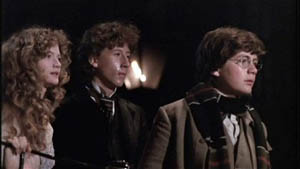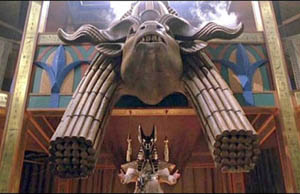|
The bulk of the narrative presented herein is sandwiched between a pair of on-screen disclaimers conceding that the story told in this film is an original creation and does not jibe with the works of Sir Arthur Conan Doyle, renowned author and credulous believer in the Cottingly Fairies. This is, presumably, to ward off the wrath of Holmes purists, who obsess over the details of a fictitious life and take things too personally when you suggest that it could've happened otherwise, or, for that matter, that it's wholly unimportant. For myself, I ask only that a film entitled Young Sherlock Holmes A. feel as though it could fit within the Holmes canon, and B. successfully entertain me. It does both, and thus I have no complaints. Well, at least not many. 
Young John Watson transfers to Brompton Academy in the winter quarter and meets an unusually precocious student who despairs of not having mastered the violin after three days of practice, and who, just for fun, gives Watson an impromptu verbal dossier on his own life. The teenaged Sherlock Holmes's abilities in the art of deduction have earned him both admirers and detractors of all ages, and it's not long before Holmes runs afoul of the latter. At the same time, a series of strange deaths begins to occur around town, all the result of powerful and nightmarish hallucinations experienced by the victims. Though appearing from the outside to be suicides or mere accidents, Holmes suspects something more sinister at work, and all the more so when his mentor, the retired tinkerer Professor Waxflatter, exhibits his own fascination with the deaths and is loath to disclose the reason why. Let's face facts: Sherlock Holmes is a great character, but film versions have taken much license with the original stories ever since they began appearing, and it's easy to see why. A great many of Doyle's stories feature a hapless supplicant wandering into 221B Baker Street to tell his or her tale, after which Holmes solves the crime without ever leaving his armchair. A fascinating ability, to be sure, but not remotely cinematic. Movies need a less sedentary protagonist; it's only significant that the essential nature of the character remain intact, and despite his highschool age, Nicholas Rowe is every bit the detective we know and love, a good but remote individual with great mental skills and a matter-of-fact recognition of his own abilities that would be arrogant if it wasn't so frequently charming and amusing. Alan Cox occasionally seems as though he's threatening to grow up to be Nigel Bruce rather than Dr. Watson, but ultimately creates a competent and invaluable sidekick whose later self narrates the tale. Sophie Ward plays Waxflatter's niece Elizabeth, the third point in our heroic triumverate and one whom we've never previously met. She's brave, sharp and warm, and we can easily see how even an aloof creature like Holmes could love her. Why I'm almost totally unfamiliar with the careers of these actors subsequent to this film is unclear, and rather sad. 
The script is by Chris Columbus, who would go on to direct the first two films in the Harry Potter franchise, and is frankly filled with much darker material than Columbus dared to bring to his Potter films, with multiple murders, including human sacrifice, and some ghoulish imagery in the form of the many hallucination sequences (one of which includes a stained glass knight come to life, the very first computer-generated character to be integrated into a live-action scene). I imagine few viewers could ever forget the steadily building chant of the creepy Egyptian cult Holmes and his friends discover, its frighteningly mounting fervor evoking both the power and the terror at the heart of religious belief. While featuring youthful heroes, this should not be mistaken for a children's movie. It is, however, often an odd pastiche of parts, some that feel quite a lot like Sherlock Holmes and those which are clearly the product of mid-'80s whimsy. An old man's fireside recollection of old and tragic events from abroad might well have been lifted straight from The Sign of Four; Holmes practically inventing the airplane, on the other hand, would've felt more at home in Columbus's The Goonies. Young Sherlock Holmes is at its best when it's simply content to be a Holmes adventure; where it sometimes errs is in a rather Indiana Jones and the Last Crusade-esque desire to give its iconic hero's every personal tic and affectation its own rather pat origin story, in a series of scenes so awash in self-awareness that they remind us of the artiface. Many of these are in the service of detailing the gradual acquisition of the traditional Holmes costume (which frankly was more the product of previous filmic portrayals than anything penned by Arthur Conan Doyle), while others are subtler and unexpectedly poignant. One such revelation left me, at the age of fifteen, actually rather upset and depressed in a way I'd never experienced before, and rarely since. By contrast, the only thing I expect to feel when the accursed Twilight series is concluded will be sheer relief that there will be no more of those damned movies coming along and choking up the multiplexes with their forced, faux drama and cardboard characters. Not all teen-centered dramas are even remotely equal. There's one other thing, besides the integrated CGI character, that this film is known for popularizing-don't stop watching until the credits have concluded. I'll say no more. -review by Matt Murray
|
|
||||||||